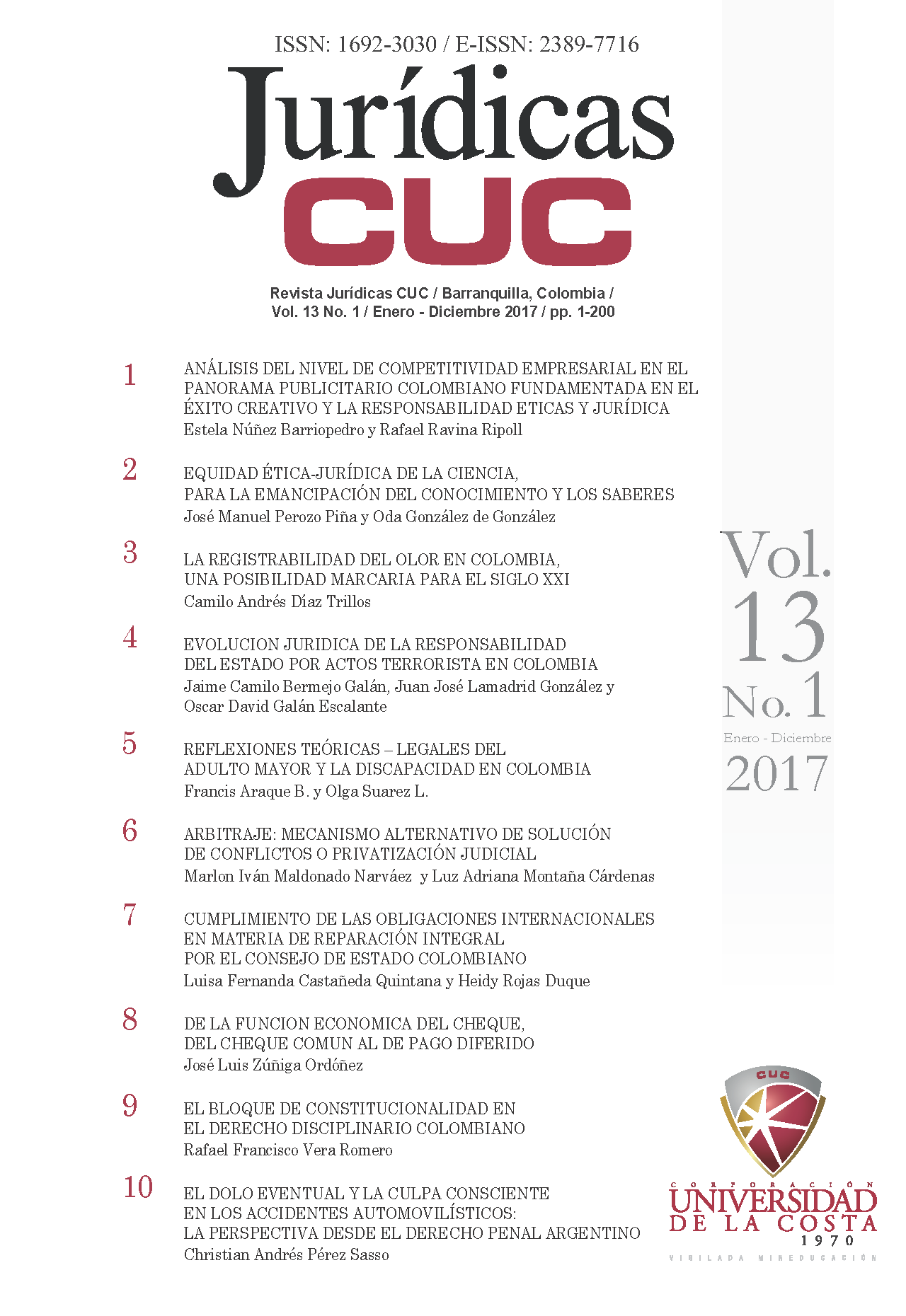Etichal-legal equity of science for the emancipation of knowledge and knowledge
DOI:
https://doi.org/10.17981/juridcuc.13.1.2017.02Keywords:
Knowledge, identity, emancipation, meaning, constitutionAbstract
The purpose of the study is to generate a discussion on the Ethical-Legal Equity of Science for the Emancipation of Knowledge and Knowledge, based on the reflective investigation of the ethical-legal principles that underpin the National Constitution of countries such as Chile, Peru, Ecuador, Colombia and Venezuela the significance of science built from the contextual foundations of knowledge, knowledge and common sense originating in South America. Reflective inquiry is oriented from juridical sociology, to approach from the contrasting and systematization of the constitutional articles, that make visible the emancipation of the integrated knowledge to the original knowledge in the mentioned countries. The article is an advance of the research project titled “Contextualization of emancipatory knowledge, from the local”, that the authors advance in the Line of Research Ethos and cultures in the Organization (UNERMB-CDHCT). The final consideration is that equity in ethical and juridical principles in the National Constitutions of Chile, Peru, Ecuador, Colombia and Venezuela to integrate knowledge and common-sense knowledge, from a science built by and for South America.
Downloads
References
Bunge, M. (1981). La ciencia, su método y filosofía. Buenos Aires, Argentina: Siglo XX
Fals, O. (2009). Una sociología sentipensante para América Latina. Consejo Latinoamericano de Ciencias Sociales - CLACSO. Colombia: Siglo del hombre.
Feyman, R. (2000). El placer de descubrir. España: Crítica.
Kelsen, H. (1988). Teoría pura del Derecho. México: Porrúa.
Lakatos, I. (1981). Matemática, ciencia y epistemología. España: Alianza.
Maturana, R. (1997). La realidad: ¿Objetiva o construida? (II) Fundamentos biológicos del conocimiento. México: Anthropos.
República de Colombia. Corte Constitucional. (2015). Constitución Política de Colombia. Bogotá, D.C.: Imprenta Nacional. Recuperado de: http://www.corteconstitucional.gov.co/inicio/Constitucion%20politica%20de%20Colombia%20-%202015.pdf
República de Chile. Consejo de Estado. (1980). Constitución Política de la República de Chile. Recuperado de: pdba.georgetown. edu/Parties/Chile/Leyes/constitucion.pdf
República del Ecuador. Asamblea Nacional Constituyente. (2008). Constitución de la República del Ecuador. Registro Oficial No. 449. Recuperado de: http://aceproject.org/ero-en/regions/ americas/EC/constitucion/ecuador-constitucion-politica-de-larepublica-del/view
República de Perú. Congreso Constituyente Democrático. (1993). Constitución Política de Perú. Recuperado en: www.portal.jne. gob.pe7/./CONSTITUCION%2POLITICA%20DEL%PERU
República Bolivariana de Venezuela. Asamblea Constituyente. (1999). Constitución de la República Bolivariana de Venezuela. Gaceta Oficial No. 5.980. Recuperado de: http://www.minci.gob.ve/wp-content/uploads/2011/04/CONSTITUCION.pdf
Ricoeur, P. (2006). La vida: un relato en busca de narrador. Argentina: UCA-Prometeo.
Sánchez, A. (1984). Ética. España: Crítica.
Sousa, B. (2010). Descolonizar el saber, reinventar el poder. Uruguay: Trilce.
Weber, M. (1964). Economía y sociedad. México: FCE
Published
How to Cite
Issue
Section
License
The authors are exclusively responsible for the published articles, which do not necessarily reflect the views of the editorial committee.
JURIDICAS CUC respects the moral rights of authors who have assigned the property rights on the published materials to the editorial committee. In turn, the authors declare that the work they submit has not been previously published.


 English
English
 Español (España)
Español (España)



